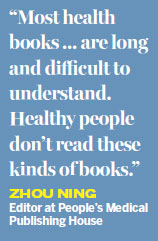Comics are the perfect antidote to ignorance
Updated: 2016-09-23 08:00
By Liu Zhihua(China Daily Europe)
|
|||||||||
Miao Zhongrong says he'll never forget the day he and He Yizhou posted their first cartoon online. It was March 17, and since then they have posted more than 100 stories.
Their account on WeChat, the social media app, has become one of most popular related to sharing health advice.
It was Zhou Ning, an editor at People's Medical Publishing House, who brought the doctors together.
"One is a medical expert who can explain complicated knowledge in interesting and simple words, the other has a PhD in medicine and has been drawing for more than 15 years," Zhou says. "They work so well together, and the books are suitable for all ages."
In June, her company published three collections of the doctors' cartoons. Each comprises about seven stories, which were all first released via WeChat. So far, 15,000 copies of each have been printed.
"Many diseases are preventable if patients know how to prevent them. But most health books often cover just one disease, and the books are long and difficult to understand. Healthy people don't read these kinds of books," she says, adding that comics are an ideal solution.
Last year, Miao authored an illustrated book on strokes, which Zhou edited.

The book covers prevention, risk factors and causes, symptoms, diagnosis, treatment and rehabilitation. It also includes information on related health conditions, such as aneurysms, which are excessive localized enlargements of an artery, and abnormal heart rhythms.
The illustrated work is meant not only for patients, but also doctors, especially those in counties and rural areas who don't have access to regular updates on medical advances.
Miao invited a group of celebrities, including actress Gao Yuanyuan and actor Huang Bo, to promote the book on Sina Weibo, a Twitter-like service.
Yet he was unhappy with the result, despite 60,000 copies being sold. For one thing, Miao argues that the book is not as easy to understand for ordinary readers as he'd hoped.
The illustrator, an art student, knows little about strokes, and Miao says it was time-consuming communicating his ideas.
Plus, reading a physical book has become less attractive to Chinese people, so relying on them entirely to promote health knowledge is a shaky proposition, he says.
Zhou adds that even though the Little Doctor Cartoons collections are one of the publishing house's key projects, many readers are unwilling to pay for books as they can consume material free online.
More effort is needed to make the books more appealing to people, she says.
Miao has another commercial plan, however. In recent stories, he has written about a cafe that Dr Panda, the central character, and his friend Sha Daidai have spent a lot of time in. He wants to find investors to actually build such a cafe, where people can read the comic books for free and get advice from a medical professional.
(China Daily European Weekly 09/23/2016 page16)
Today's Top News
State of emergency declared in US city amid protests
Universities given boost in rankings
Demand for Mandarin rises in UK
China 'capable of keeping medium-to-high growth'
Li tells Obama of opposition to THAAD deployment
Greek vows to improve refugee situation on island
UN suspends aid convoys following deadly strikes
New York bombing suspect captured in New Jersey
Hot Topics
Lunar probe , China growth forecasts, Emission rules get tougher, China seen through 'colored lens', International board,
Editor's Picks

|

|

|

|

|

|







